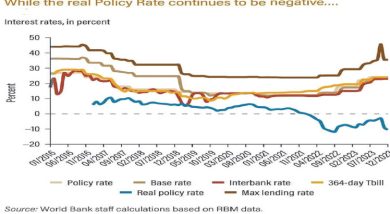RBM’s new facility to help stressed banks

The Reserve Bank of Malawi (RBM) has introduced a new facility called Lombard which will attract an interest rate of 27 percent, two percentage points higher than the bank rate, to assist liquidity-stressed commercial banks.
At its recent Monetary Policy Committee (MPC) meeting chaired by Governor Charles Chuka, the central bank also changed the composition of the Liquidity Reserve Requirement (LRR)—the amount of funds that banks must hold in reserve against deposits made by their customers.
Commercial banks are obliged to maintain a minimum amount of cash for possible bank run-ins or otherwise they have to borrow from other banks or through discount window facility.
Although the cash-constrained banks can borrow from others on the interbank market, the MPC meeting resolved to introduce the Lombard facility to assure struggling commercial banks access to funds.
Explaining the rationale of the facility on Saturday, RBM spokesperson Mbane Ngwira said the Lombard is designed to be a last resort for commercial banks while ensuring discipline in the money market.
“The Lombard facility will ensure that commercial banks have a standing access to money from the RBM as long as they meet requirements regardless of the liquidity situation on the market. The commercial banks will however pay a price for this facility at two percentage points above the bank rate so that it has to be the last resort,” said Ngwira.
He said other RBM securities will still be traded around 25 percent to ensure interest rates are around the bank rate.
Although the MPC maintained the LRR at 15.5 percent, it decided that vault cash will not count as part of the ratio and that eligible financial institutions will be required to maintain a minimum of 12 percent of the revised requirement.
Ngwira said because vault cash would not be immediately verified by the central bank, it caused some variations in required reserves.
Meanwhile, the RBM has blamed the recent weakening of the kwacha against other foreign currencies on the recent withholding of donor aid by Malawi’s major donors.
The central bank has since pledged to further tighten its monetary policy to contain the prevailing sharp pace of the local unit’s depreciation, according to the MPC minutes.
“It was observed that despite the current level of official reserves being much higher than last year, the sharp kwacha depreciation reflected largely on the loss of donor support which constrained the central bank’s ability to defend the kwacha,” read in part the minutes.
Malawi’s major donors under the Common Approach to Budget Support (Cabs) are withholding budget support worth $150 million (K60 billion) following the revelations of massive public funds abuse at Capital Hill popularly known as cashgate.
In the 2013/14 national budget, donors are financing 41 percent of the 2013/14 national budget.
The kwacha has sharply lost ground to the dollar, trading at as high as K455, which is way above the K330 mark the currency was trading to the greenback in June this year.
A weak kwacha hurts importers hard as well as Malawian students who are obliged to pay their tuition and examination fees in foreign currency as they are forced to cough more kwacha to meet their demands.
However, RBM attribution of the kwacha depreciation to loss of donor support is in sharp contrast to Finance Minister Maxwell Mkwezalamba’s recent statement, who blamed the kwacha fall on speculation on the market and not because of the shortage of foreign exchange on the market.
Malawi consumes $188.1 million (K86 billion) per month which is equivalent to the country’s one month of import cover, according to RBM.
According to the minutes, as at mid-November 2013, gross official reserves stood at $406.2 million or 2.2 months of import cover, adding that such a position is expected to be sustained up to end-March 2014.
The RBM has also admitted that the economy is facing constraints emanating from the recent public finance management scandal which has resulted in the postponement of aid disbursements.






Is there such a thing as struggling banks in Malawi? They do not lend to a wider market and just pocketing profits in form of charges and high lending rates. It’s the small and medium businesses with credible business plans that require loans to stimulate economic growth. Our banks make abnormal profits and certainly have enough liquidity to stay afloat.